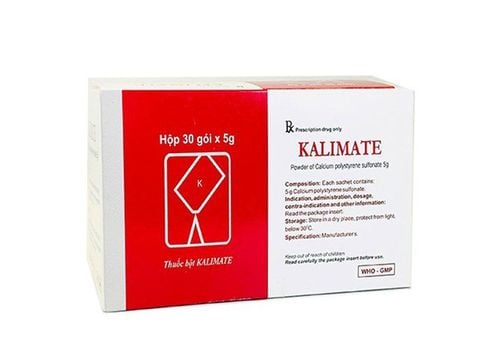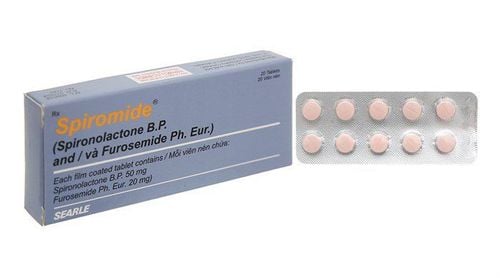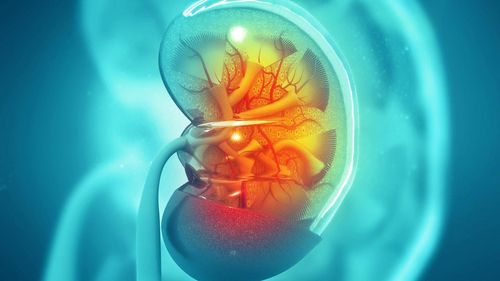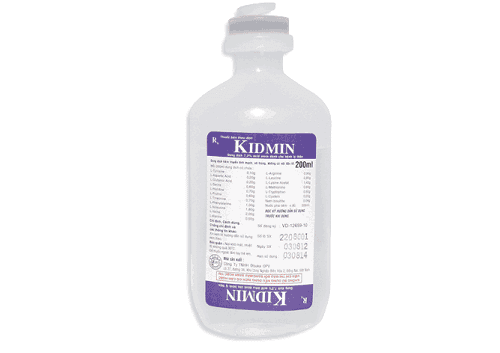This is an automatically translated article.
The article was professionally consulted by Dr. Tran Quoc Tuan - Emergency Medicine Doctor - Emergency Resuscitation Department - Vinmec Phu Quoc International General Hospital. Doctor Tran Quoc Tuan has more than 12 years of experience in emergency resuscitation.Kidney failure is one of the diseases that seriously affects the health and life of the patient. The most common complication of kidney failure is hypertension (high blood pressure).
1. What is kidney failure?
Kidney failure is a condition in which the main functions of the kidneys are severely impaired, including the function of excreting waste products, regulating fluids, acid-base, electrolytes, synthesizing vitamin D, or stimulating the body's hematopoiesis. . In medicine, kidney failure includes the following conditions:Acute kidney injury: kidney function is only impaired for a few hours or days, then can return to normal with treatment early and properly. Acute kidney failure: similar to acute kidney injury, however, this condition should be treated with hemodialysis, in order to control and prevent possible dangerous complications, and at the same time preserve the quality of life. network for the patient. Chronic kidney disease: continuous decline in kidney function within 3 months, accompanied by abnormal symptoms in urine, kidneys or histology detected through diagnostic tests. When you have chronic kidney disease, the functions of the kidneys are not able to recover on their own. End-stage chronic renal failure: kidney function is severely impaired and there is a high risk that patients need kidney replacement to save their lives.

Suy thận khiến chức năng thận suy giảm và gây ra nhiều biến chứng nguy hiểm
2. Symptoms of kidney failure
Common signs and symptoms of kidney failure include:High blood pressure Decreased urine output or difficulty urinating Frequent urination at night Swelling in the face, hands or feet due to fluid retention Bitter mouth, loss of appetite Body fatigue, headache, dizziness, lightheadedness, nausea Pale, pale skin due to anemia Bone and joint pain Toothache or bleeding gums Dark lips Decreased sex drive.
3. How are kidney failure and hypertension related?
The kidneys are a pair of regulatory organs located on either side of the back. Its main function is to act as a filtration system that helps remove waste products and excess fluids from the body.The kidneys and circulatory system depend on each other to perform the main tasks and functions in the body. The kidneys help filter waste and fluids in the blood. To do this, the kidneys need a great deal of support from the blood vessels. When these blood vessels are damaged, the nephrons that filter the blood don't get the oxygen and nutrients they need to function properly. This is also why high blood pressure (HBP or hypertension) is the leading cause of kidney failure. Over time, uncontrolled high blood pressure can cause the arteries around the kidneys to narrow, weaken, or harden, resulting in an inadequate blood supply to the kidney tissues. Several conditions of kidney damage are caused by high blood pressure, including:
Kidney scarring (glomerular fibrosis): occurs when the small blood vessels in the kidneys are scarred, resulting in the inability to filter fluids and fluids. efficiently removed from the blood. Glomerulonephritis can lead to kidney failure. Kidney failure: High blood pressure is one of the most common causes of kidney failure. Damaged blood vessels interfere with the kidney's ability to filter waste, causing fluid to accumulate. Patients with kidney failure require dialysis or a kidney transplant. In general, kidney failure and high blood pressure are interrelated. As mentioned above, high blood pressure can cause kidney disease, while a leading complication of chronic kidney failure is high blood pressure. The kidneys not only have the role of filtering fluids in the body, but they also have a special task of keeping blood pressure at a stable level. Once the kidney is damaged, it will lead to a decline in kidney function, including the ability to regulate blood pressure. Disrupting this balance causes blood pressure to rise too high, which can cause other health consequences for the patient, such as heart disease or stroke. Here are some common kidney diseases that are more likely to raise blood pressure, including:
Renal artery stenosis : this is a kidney disease that is most likely to lead to high blood pressure. When the renal arteries are narrowed, blood flow through the kidneys is reduced, and the secretion of aldosterone and angiotensin is increased, leading to increased blood pressure. This disease is not only the main cause of high blood pressure, but it is also the cause of dangerous kidney complications, especially chronic kidney failure. Chronic pyelonephritis: The renal pelvis is the bridge between the kidney and the ureter. Chronic pyelonephritis occurs when the renal pelvis becomes inflamed due to stones. Symptoms of pyelonephritis include fever, urinary disturbances, urinary incontinence, painful urination, tight hips, or abdominal pain. In addition, the disease leads to malignant hypertension (which tends to be progressive). Glomerulonephritis: there are two types of glomerulonephritis, including acute and chronic glomerulonephritis. The disease occurs due to an immune disorder or a complex of antibodies and antigens of group A hemolytic streptococci. The most common complication of glomerulonephritis is hypertension. Statistics show that more than half of people with glomerulonephritis have high blood pressure. The main cause of this condition is blocked arteries in the kidneys, causing the glomeruli to swell and change size. Polycystic kidney disease: reflects a condition in which the kidneys appear many cysts. The hallmark of this disease is paroxysmal diastolic hypertension in the early stages of the disease. Polycystic kidney disease, if left untreated, can lead to kidney failure. Thus, we can conclude that kidney failure originates from high blood pressure and vice versa, high blood pressure is a complication or consequence of kidney disease. Therefore, it is important to control blood pressure well to prevent kidney disease, and at the same time, patients who already have kidney failure need to be treated early and promptly to avoid the risk of high blood pressure.
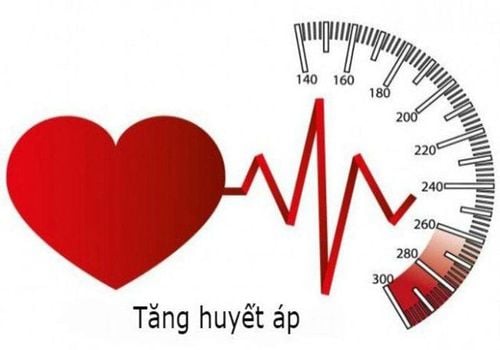
Suy thận dẫn đến tăng huyết áp
4. Measures to treat kidney failure
To prevent kidney damage caused by high blood pressure, you should be aware of the following:Try to keep your blood pressure at a reasonable level Check your blood pressure regularly Follow a healthy diet : eat a lot of green vegetables, fruits, eat light food, eat less fat or foods containing a lot of phosphorus such as cheese, yogurt, beer,... Exercise regularly - about 30 minutes a day . For patients suffering from both kidney disease and high blood pressure, the most important and effective treatment is still controlling blood pressure through blood pressure changes. change your daily life. Experts recommend that blood pressure should be below 130/80mmHg to prevent kidney damage from getting worse and help reduce the risk of cardiovascular disease.
In addition, patients may be prescribed ACE inhibitors and angiotensin II receptor blockers (ARBs) to lower blood pressure and protect the kidneys from further damage.
Patients need to achieve the goal of treatment to control blood pressure below 130/80mmHg, prevent kidney damage from getting worse, and prevent cardiovascular risk. During treatment, patients need to have periodic tests to assess kidney failure, measure potassium in the blood, to adjust medication and diet to best suit the disease. Renal scintigraphy is a highly effective method of diagnosis and treatment of acute renal failure. This is a technique to evaluate kidney function using modern high-precision recording devices. Kidney scintigraphy gives high-quality images that show the exact condition of the kidney and kidney failure in order to have the right and most effective treatment.
Vinmec Times City International General Hospital uses the SPECT/CT Discovery NM/CT 670 Pro equipment system, with the most modern 16-row CT of the world's leading medical equipment company GE Healthcare (USA), for high-quality images, helping to diagnose diseases that need to be investigated early.
Vinmec team of experienced doctors, well-trained at home and abroad, directly advise and provide maximum support to customers during the shooting process, even for foreign customers .
Please dial HOTLINE for more information or register for an appointment HERE. Download MyVinmec app to make appointments faster and to manage your bookings easily.
Articles refer to sources: heart.org, mayoclinic.org, webmd.com




